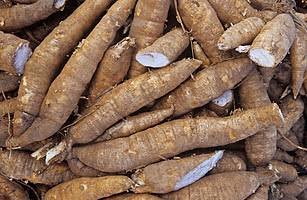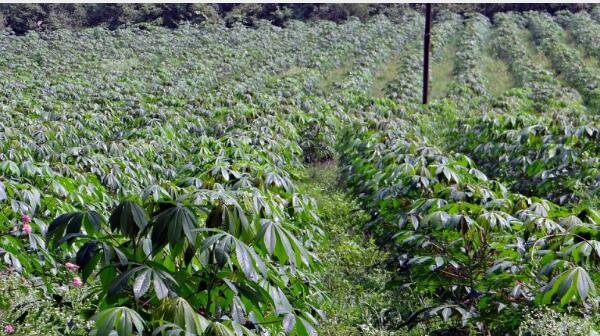
Image source: google
Nigeria is one of the countries producing cassava in large quantity in the world, alongside countries like Ghana,Senegal, Benin Republic, Cameroon, etc. Nigeria is a country where recession is not supposed to be heard of because we are blessed with what it takes to be one of the econimically stable countries in the world, but reverse is the case as we take virtually everything for granted and therefore, miss opportunities a lot.
Cassava farming is heavily nd secretly loaded for anyone who has foresight . Cassava is enriched with so much carbohydrates, and it can be used to make different types of food like cassava flour which can later be processed into local foods like fufu and garr; cassava can also be used to make tapioca, cassava chips, animal feeds,bread, glucose, biscuits,beverages, snacks and lots more. It is also used industrially as glue for plywoods, pharmaceutical industries, textile industries, and can also be processed into alcohol. The starch we derive from cassava is said to be one of the best forms of starch.
People globally demand the derivatives of alcohol in a significant amount because hardly can a family go a day without consuming cassava related food.
Enterpreneurs who only want to make money must invest heavily in cassava farming and within a short period of time, millions will be smiling in their account.
There are some steps to follow strictly when about to engage in cassava farming. The steps, if followed strictly will enhance a good result as well as bountiful yield.
THE STEPS ARE:
SELECTION OF SITE:
It is essential to choose a site that is best for the cultivation because it will enhance good result as well as bring about bountiful harvest. An accessible well drained fertile soil is advisable. The soil sample can be taken to IITA for testing in order to know if it will be able to produce high yield of cassava variety. The soil in most south west areas of Nigeria is favorable for cassava farming, but the confirmation is somewhat essential in order for one to be sure.
*CASSAVA VARIETY:
For good cassava production, the following varieties are recommended; TMS 30572, NR 8082, NR 8083, FMS 4(2)1425, TMS 81/00110, TMS 92/0326. Additional varieties are about to be released. Good varieties are much essential for the cassava to flourish while growing.
*LAND PREPARATION AND PLANTING:
The site that has been selected earlier must be carefully prepared before planting. The preparations include clearing the bushes that might want to compete with the cassava in terms of nutrient and water, addition of herbicides ( glyphosphate is recommended)on the proposed land must be ensured at least 10days before planting at the rate of 4-5 litre per hectare. And also, means of irrigation must be made available to avoid shortage of water. During land preparation, at least 5 bags of 50kg agricultural lime must be applied on one hectare of land. If planting has already been made without application of herbicides, application of pre-emergence herbicides must be adopted within 3 days after planting, 5 litres of primextra is recommended per hectare.
*APPLICATION OF FERTILIZER:
fertilizers are essential on the land where we are growing our cassava in controlled quantity and quality. The following are recommended;
¶NP2 Pieces of 50kg bag
¶NPK 20:10:10 --------------------------------- 9 Pieces of 50kg bag
¶NPK 12:12:17 ------------------------------- 15 Pieces of 50kg bag.
Fertilizers should be added within 8 weeks after planting the cassava. It must be added with care around the cassava plant and we must make sure it doesn't touch d cassava leaves or stem. It can be added in a ring, 6cm wide and 10cm away from the cassava plant.
NOTE:
<> Cassava planting starts in April and can be extended till October
<> 60 bundle of cassava stem is recommended for one hectare of land
<> On a spacing of 1m×1m, cassava stem cutting of 25cm long should be planted
<> 100% cassava planting rate must be maintained by replacing non-viable and dead stems
<> If every steps followed strictly and seriously in the process of planting the cassava, coupled with good agronomic practices and management, yield of 25tonnes per hectare and above is certain.

A typical cassava farm.
Image source:google
ANALYSIS OF PRODUCTION COST FOR CASSAVA FARMING ON ONE HECTARE OF LAND IS AS FOLLOWED;
Land preparation ……………………………………………………… N10,000.00
Cassava cuttings (60 bundles @ N300/bundle) ………………N18,000.00
Planting (4 person at N1000/pd) …………………………………..N4,000.00
Pre-emergence herbicides (5 liters at N1000/l) ………………..N5,000.00
Fertilizer (20:10:10, 9 bags at N2500/bag) ……………………..N22,000.00
Insecticides (2 liters at N1000/l) ……………………………………N3,000.00
Application of herbicide ……………………………………………….N3,000.00
Application of insecticide ………………………………………………N 3,000.00
Application of fertilizer (4 persons at N1,000/pd) ……………..N4,000.00
One weeding (10 person at N1,000/pd) …. ……………………..N10,000.00
Harvesting (15 person at N1,500/pd). …………………………….N17,500.00
Total ……………………………………………………………………….. N100,000.00
NOTE: Farm Labor Wage Rates are different based on location.
Please upvote, comment and resteem.
Thanks.
Nice write up you have here. This is making me to think about agriculture... Cassava farming especially.. 😂
Thanks so much @simplewole. I think you should give it a try, it's really lucrative.
nice post